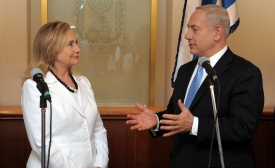bashar al-assad
Doing nothing when war crimes are committed is immoral. It is also bad policy. But a response to war crimes such as those perpetrated by the Syrian regime of Bashar al-Assad must be more than a display of righteousness; it must become an element of a broader foreign policy initiative. This is the challenge facing the Trump administration after the missile strike launched by the United States

Could the missile strikes on Syria enhance U.S. soft power? Philip Seib considers the possibility at the CPD Blog.
Russia knows that soft power requires hard power. Given the mutually hurting stalemate in Syria, the only way to convince Assad that the terms of peace will not be against his interests was to back him up militarily.

Anti-extremism messaging isn't working. So why are governments reluctant to change tactics?
The Obama administration began its dealings with the Arab world on a hopeful note, as exemplified by the President's 2009 Cairo speech. Since then, despite increased U.S. public diplomacy efforts in the region, American policy has been perceived as hostile, or at least uncaring, toward Arabs.

Philip Seib on what the U.S. is getting wrong in the Middle East.
More prominent voices—today it’s the former head of the British army—are now advocating the previously unthinkable position that Western governments should open dialogue with Assad. I don’t see that happening, but as Reuters reports, the regime now seems to be expecting a quieter opening...
Last year, the Syrian military-police photographer defected to the West. Investigators later gave him the code name Caesar to disguise his identity. All told, Caesar helped smuggle more than 50,000 pictures out of Syria—his own and many others he downloaded that were taken by other photographers, according to activists working with him.







